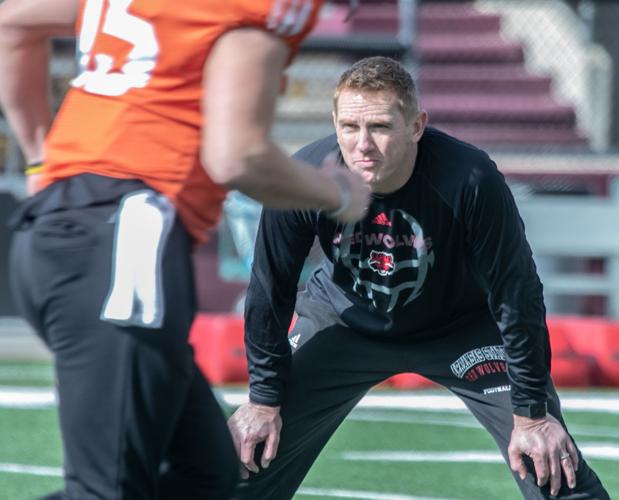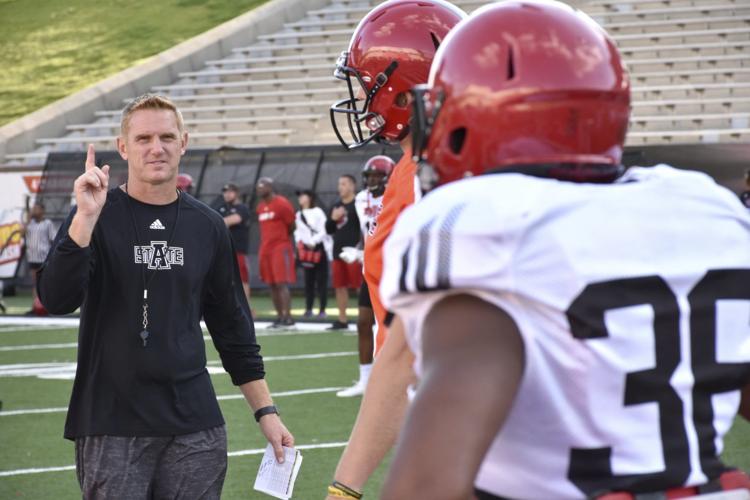By the time Blake Anderson arrived in Jonesboro, Arkansas, in December 2013 to interview to be the next Arkansas State Red Wolves head coach, it’s easy to understand why local real estate agents were quick to offer him the latest rentals.
For three straight years, a head coach had come to town promising commitment and faithfulness only to be lured away by the promise of bigger conferences, ritzier towns and, yes, higher salaries.
The names are still among the hottest in college football. Hugh Freeze. Gus Malzahn. Bryan Harsin.
Each of them hadn’t just used Arkansas State as a steppingstone, but as a launching pad. Freeze to Ole Miss. Malzahn to Auburn, where he’d win a national title in his first season. Harsin to Boise State, where he took over for his former mentor, Chris Petersen.
Who could blame them? The program had won 10, nine and seven games in successive seasons with successive coaches. The town had a winner, albeit one with temporary license plates, with three straight bowl berths.
But, Anderson said, all that upheaval had taken its toll. When he interviewed with Arkansas State athletic director Terry Mahojir, you can imagine what the conversation centered on.
“Stability was a big talking point during the process. Five head coaches, five years had really never been done before,” he said. “I was adamant when I came in I wasn’t looking to be a one-and-done guy. You go back to my buyout, it was enormous, a $3 million buyout. Every one of those guys had said the same thing, we’re gonna be here, buy into it, and all of them felt they needed to leave and have been successful in their own right. But for us, being the fifth guy in that cycle, I couldn’t just say it. We had to live it every day. Culture, environment, morale — those way outweigh what you do on the field. We had to build trust.”
It wasn’t an easy process.
Anderson remembers his initial meeting with Arkansas State faithful, telling them, “You’re not going to be ready to trust me, I understand that. You’ve been told I’m not leaving before. You’re going to realize to trust us when you see us coming back every single day.”
“You can’t speed that process up,” he said by phone this week, as the Red Wolves prepared for the Arizona Bowl, their fifth straight bowl appearance under Anderson and eighth overall.
• • •
College football is such a brutally cutthroat business that it’s rare to find a coach who isn’t looking to better-deal someone.
But Anderson learned before what the rat race could do to a soul.
Early in his career, after yet another sleepless night of recruiting, Anderson found himself at what he calls his rock bottom.
His work/life balance was tilted so far in one direction it might as well have been a see-saw with an offensive lineman on one side. He vowed that if he ever got lucky enough to run a football program, he would do so with his compass pointed in the right direction.
“I always promised my wife and the guys I knew I’d hire that if I got the opportunity to run a program, he’d try to do it with priorities in place and balance in place,” he said. “The first half of my career, I didn’t do a good job of it. My life came crashing down around me in the early 2000s. I was so out of whack. I was losing my wife. Losing my kids. I had no sense of balance in my life. I didn’t want to be that way anymore. I put God first, family second — and football falls into place.”
Anderson made faith, family and football the centerpiece of his pitch to a talented coaching staff that has mainly stayed in place since his hiring.
“I may not be able to pay you as much as I want,” he told them, “but there will not be a better environment to do what you love.”
The pitch paid off. It landed him one of the game’s best recruiters in former Auburn assistant head coach Trooper Taylor, a college teammate of Anderson’s at Baylor who too had grown tired of the toxic hours required of national championship-contending football.
“It matters to work for a guy like Blake Anderson,” said Taylor, who previously coached at Power 5 schools Oklahoma State, Tennessee and Auburn. “He gave me the guts to make that move. To make less money. He walked away from football. He thought he was losing his family. I don’t know I ever could have done it. He walked away from the game and went and sold insurance. When he came back, he told me about the same thing. If you would’ve told me 25 years later, I’d be coaching for the red-headed walk-on wide receiver I played with? I never would’ve thought that. What if I never would’ve hung with him? This guy gave me an opportunity for my son to come player here, my daughter plays basketball here, my wife is a professor. The Taylors are Taylor-made for Arkansas State. I’ve been as happy here as anywhere.”
Here’s how different things are in Jonesboro: The Red Wolves assistant football coaches also coach Little League. If they have to leave for a game, other coaches take notes for them.
Look, it’s not going to last forever. Some assistant will be plucked by a Power 5 program and the money will be too good to pass up. Anderson isn’t naïve. He may leave someday himself. He doesn’t control the future.
“They will be tired of me at some point or there might be an opportunity that comes up that’s a fit, but I’m content that I’m not in control of that,” he said. “I’m going to focus on treating my staff great, my players great, enjoying every minute of it. I make more money than I should. Salaries are inflated. We all do. The money is great, but that’s not the purpose of why I got into it.”
• • •
For a man who has brought stability to a place seeking it so, Anderson’s life has been in a constant state of turmoil for almost two years.
A little over 18 months ago, doctors discovered triple-negative breast cancer in Wendy Anderson, Blake’s wife and the mother of his three children. What followed was a painful ordeal that included first being told surgery was not an option, then that it was. They opted for immunotherapy in Mexico over chemotherapy.
The cancer was kept at bay for more than a year, but in September, Wendy experienced shortness of breath, and doctors discovered the cancer was back and had spread.
“I noticed she was coughing a lot then and it wasn’t normal,” Blake Anderson told ArkansasOnline in early December. “We tried to write it off as bronchitis. We tried to write it off as a respiratory infection. We tried to write it off as (acid) reflux — you name it. We tried to write it off as anything we could. Ultimately, we figured out exactly what it was.
“Really, we were searching for any other answer, but the cancer was back.”
The Andersons announced the news in late November, after the regular season finale.
Anderson said the outpouring of support — both after the initial diagnosis and after the announcement of the reoccurrence of the cancer — has been overwhelming.
“I don’t know how we’d do without the support,” Anderson said. “Without the love, the support, the community. Hundreds upon hundreds of calls, texts, letters, food sent to the house, flowers. An outpouring of prayer and care and support. It’s what’s fueling my wife’s energy to fight every day.”
That’s what happens when you build a home somewhere.
That’s what happens when you commit to a community and actually live up to that commitment.
“We work way too dang hard to let yourself buy into the noise,” Anderson said. “This job is bigger than one big game or one season. You win a championship and immediately people forget. You have to enjoy the people and the relationships. I think we’ve done that here. This might be the only head coaching job I ever have.
“We’re fortunate to be in a place where the people at the top are committed to giving us the resources to be successful,” he continued. “I mean, we’re the only stadium in the country with waterfalls in the end zones. We’ve come in here and taken over a program and people put us in a position to be successful, but it’s also a place where the community has wrapped their arms the program and around us. A lot of programs are set up to be disappointed. You can’t win, even if you win. It makes this job that much better. It makes you very appreciative of what you have.”





